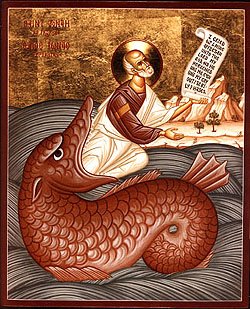Jonah - Fish Tales and Good Friday

Jonah a prophet of the
Within the book of Jonah multiple themes of God’s providence, the consequences of sin, and the forshadowing of Christ are apparent. Along with several themes, a brief summary of the Fathers approach and use of Jonah will be included. Several of these sub-messages seem unrelated, but when taken in light of the ultimate theme of God’s great mercy the book’s connections are clearer.
Jonah is one of the few books of the Old Testament where the reader sees someone from the covenant nation of
God’s sovereignty is also evident within the pages of Jonah. Jonah runs from God’s purposes, yet he finally repents and God’s plan of salvation is accomplished. Even through the weaknesses of man, God is able to work and even accomplish miraculous deeds in impossible situations. This is a great lesson that should bring comfort to each Christian; God will accomplish His work even if circumstances point toward a different outcome. He is in control and truly sovereign over His creation.
Jesus uses the image of Jonah as an image of Himself. In Matthew 12:39-40: “For as Jonah was three days and three nights in the belly of the great fish, so will the Son of Man be three days and three nights in the heart of the earth.” This image of Jonah becomes a type of Christ’s descent into Hades and eventually resurrection. This is the image that the Fathers of the Church continually turn to when they speak of Jonah. Jonah is a type of Christ’s death and resurrection. The matins canon at the Exaltation of the cross pictures Jonah’s arms outstretched in prayer forming a cross that gives power over death. Jonah’s prayerful image of the crucifixion was the power that burst Jonah forth from the belly of the fish.
Another Father of the church should be mentioned because of his allegorical approach to Jonah. It is related to the typological interpretations, but takes the images a step further in order to display salvation history. Methodius of Olympus (d. 311) in his treatise on the resurrection uses Jonah as an image of the first man Adam fleeing from God because he is found naked of the life of God. The ship is an image of earthly life, and Jonah’s casting from the ship represents the fall of man from life to death. The sea and the fish represent time and the carnal life swallowing man and holding him hostage from life eternal. However, Jonah’s expulsion from the fish represents God’s act of salvation and raising man from death to life through the power of the resurrection.
Each of the themes above point to the ultimate message of Jonah. Jonah message is a message of God’s mercy. God does not merely show mercy on a select group of people, but on all. Jonah knew this and in chapter 4 it becomes clear that Jonah’s motive for running is that he did not want God’s mercy poured out upon his enemy
Jonah had proclaimed this in his famous prayer from the belly of the fish when he concluded:
“Those who regard worthless idols, forsakes their own Mercy, but I will sacrifice to You with voice of thanksgiving. I will pay what I have vowed. Salvation is of the Lord.”
Idolatry is a rejection of God, and therefore His mercy. The image is of God pouring out His mercy but mankind turning a blind eye toward God to follow after something that has no mercy. Man can not run from God without consequences, because in doing so man cuts himself off from the very life of God. Jonah becomes an image of this in his book. Jonah runs from God, in a sense forsaking his own mercy offered by God not only for himself but also for the people of
As stated earlier Jonah is read on Holy Saturday, and his prayer is used as Ode Six and this message of mercy comes through clear in the hymns of the Ode on Holy Friday. The Church on Holy Friday is experiencing the burial of Christ. Jesus has died as the ultimate expression of God’s mercy to mankind. The refrain of Ode Six in the canon is as if Jonah is preaching the lesson he learned so long ago. Jonah speaks to the soldiers who guard the tomb of Christ:
“Falsely, and in vain do you guard, O watchmen, for you have neglected your own mercy.”
Unbeknownst to the soldiers, the body they are guarding is the body of the Son of God who died to bring God’s mercy to all mankind. Their guarding is in vain because Jesus will rise again in victory pouring out mercy to the whole human race. Trying to keep Christ in the tomb is a rejection of the mercy He brings to the world. Once again Jonah’s life typifies this message. Jonah’s descent into the fish while being an image of Christ also illustrates how far and deep God’s will reach to save. He will even raise Jonah from certain death to save
Jonah is a short book, yet contains a powerful message. It is one that has been appropriated by Church and used in her hymns and writings to convey God’s love for man in that He would send His own to Son to die and raise again to bring mercy to the world.
Comments